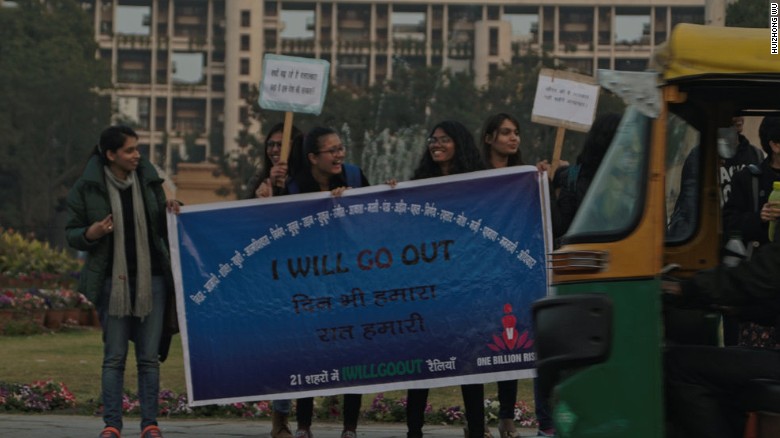'The day is ours and so is the night': Furious Indian women fight back
It was Friday evening around 7 p.m. and Ankita Luharia was walking on a busy road in the northern Indian city of Jaipur.
"Where are you going? Tell us your address," said one of the men. It was a jeer that Luharia was accustomed to. The 30-year old felt a little scared, but she kept walking.
The next day, Luharia found herself walking on another busy street -- this time she was marching with about 40 others in the city's center. It was dusk and the evening rush hour was starting, but it was a completely different feeling. Luharia was not nervous.
"The day is ours and so is the night," she shouted, along with the other men and women.
Their march was a part of #IWillGoOut -- a nationwide march of thousands in India reacting to an alleged attack on multiple women in Bangalore on New Year's Eve.
"Girls should have the freedom to move easily, whether it's day or night," Luharia says.
Organizers initially planned for marches in India's metropolitan centers like Bangalore, Delhi and Mumbai, but soon received requests to join from all over the country.
On January 21, thousands of women in 30 different cities and towns across India marched for a woman's right to feel safe in public places. "It's only fair that you know right at the beginning of this email that we are angry. Furious, actually," the organizers said in a press release.
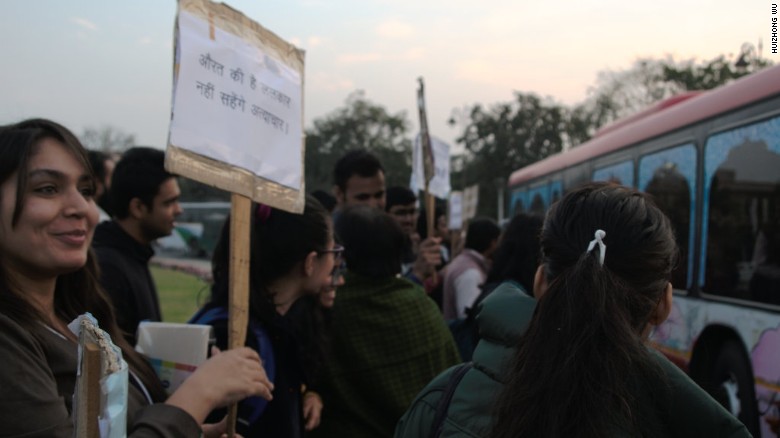
Himanshi Goyal (L), the city organizer for #IWillGoOut, stands in protest in Jaipur's Statue Circle.
Attendees of the Jaipur march say they're fighting for a basic right -- to be able to walk alone at 7 p.m. without fear. But in smaller, more traditional cities, they say many consider it too risky to go out.
"If I don't reach home by 8 p.m., my parents will be calling me," says Himanshi Goyal, a Jaipur native and the city's #IWillGoOut organizer, who has also lived in Mumbai.
Focused on India
Although the #IWillGoOut march coincided with the global Women's March against the newly-inaugurated President Donald Trump on January 21, its organizers were careful to keep the message of the marches focused on the challenges that India presents for women.
"We align with the overarching causes of marching against patriarchy and misogyny, but the context in India is very specific," said Divya Titus, another of the march's organizers.
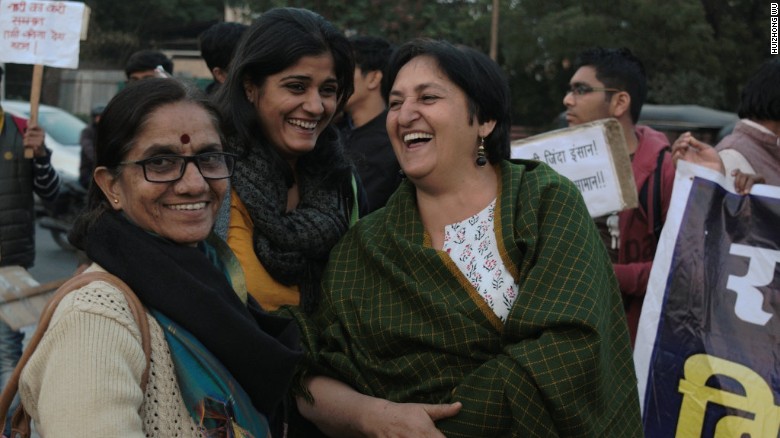
Ankita Luharia with fellow protesters at the march in Jaipur.
In 2012, sexual violence against women in India gained prominence after a gang of men brutally raped and attacked a young woman, Jyoti Singh Pandey, as she and her friend were returning from watching a film in the nation's capital. The anger in the aftermath of the rape led to protests across the country.
In response, the central government quickly passed tougher laws with harsher punishments.
According to the National Crime Records Bureau, the number of reported rapes in 2015 was 34,651, compared to 24,923 in 2012, suggesting an increase in the reporting rate.
But widespread change did not happen.
The problem still remains in a lack of political will, says Aruna Kashyap, senior counsel for the women's rights division of Human Rights Watch.
"There hasn't been the push needed to implement these laws at the state level," says Kashyap.
She says there is experimentation and change locally, but India's size presents its own particular challenges.
"We're not talking about massive waves of change, but there are small things that have worked," she says, pointing to the development of an app called Safetipin. The app allows women to mark out which parts of a street are safe and well-lit and which parts are dark and require caution.
"Policy makers should be looking at those examples," she says. But the challenge is finding solutions and then implementing them for a diverse country of 1.3 billion. It's a question of "how do we scale this up?" she adds.
"The overall response to women's safety is rooted in protectionism -- keep them at home, keep them safe -- rather than create spaces that are safe and equal," says Kashyap.
In the eyes of some, this sentiment was apparent in the statement from the home minister of Karnakata state, G Parameshwara, in the wake of the Bangalore incident on New Year's Eve.
He generated controversy when he appeared to blame the victims. "They try to copy the westerners, not only in their mindset but even in the dressing," he said at the time. "So some disturbance, some girls are harassed, these kinds of things do happen."
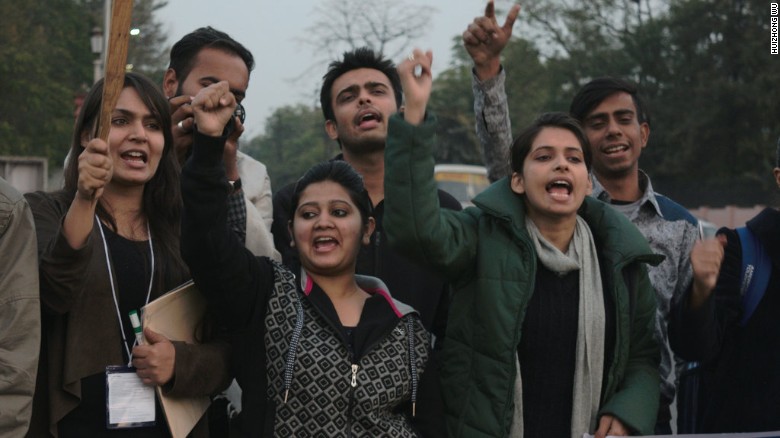
Both men and women protest in Jaipur to mark the #IWillGoOut campaign.
He later clarified his remarks, saying he was misinterpreted.
However, for some Indian women, that comment was a sign that things have not changed enough, and it was time to take to the streets again.
"We've been doing this for four years, we need to ask ourselves where we're really at," said Bhani Rachel Bali, another #IWillGoOut organizer.
'The day is ours, so is the night'
The march organizers -- young Indian women from across the country -- said they were surprised by the attention and response they received from social media and the country's Indian and English-language press.
Many had never planned something of this scale before, Bali said. It was also new ground for some attendees.
Yashashvini Jodha, a 19-year old student who lives in Jaipur, said this was her first public protest. She's usually home by the time the march got underway.
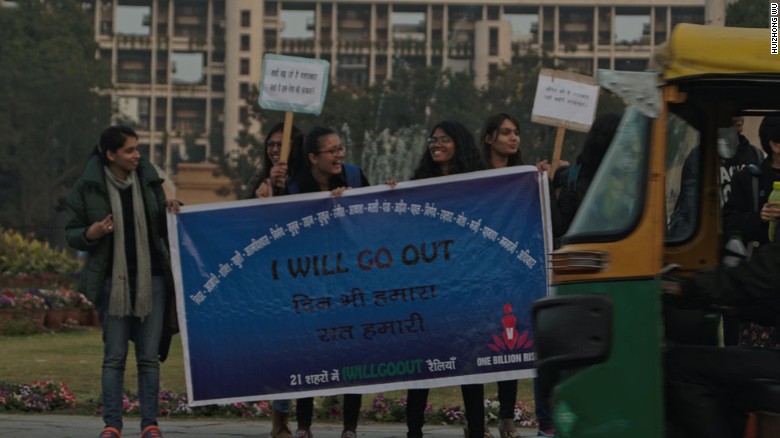
Yashashvini Jodha and Arushi Malik (center) protest in the northern Indian city of Jaipur, Rajasthan.
"My parents don't let me come out at night," she said. "As soon as it gets dark, I should be heading home. If I'm not home, I'll be getting calls."
Jodha marched near the front with her friends, holding the blue #IWillGoOut banner. She shouted loudly as protesters pumped their arms up and down and shouted, "What do we want? Freedom."
"It's quite exhilarating because I've never been on a public road, protesting something," she said.
Yet, at the end of the march, when the sky had become dark, Jodha and her friends did not linger long.
Instead, they checked their phones for missed calls from their parents, and quickly shuffled off to find an autorickshaw to take them home.
News Courtesy: www.cnn.com

